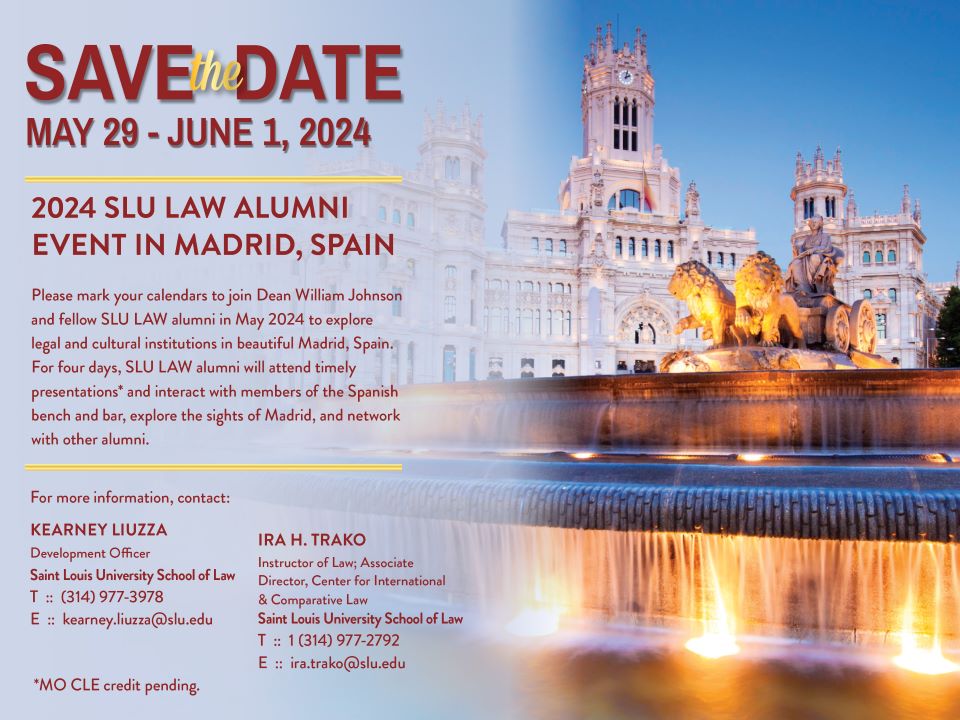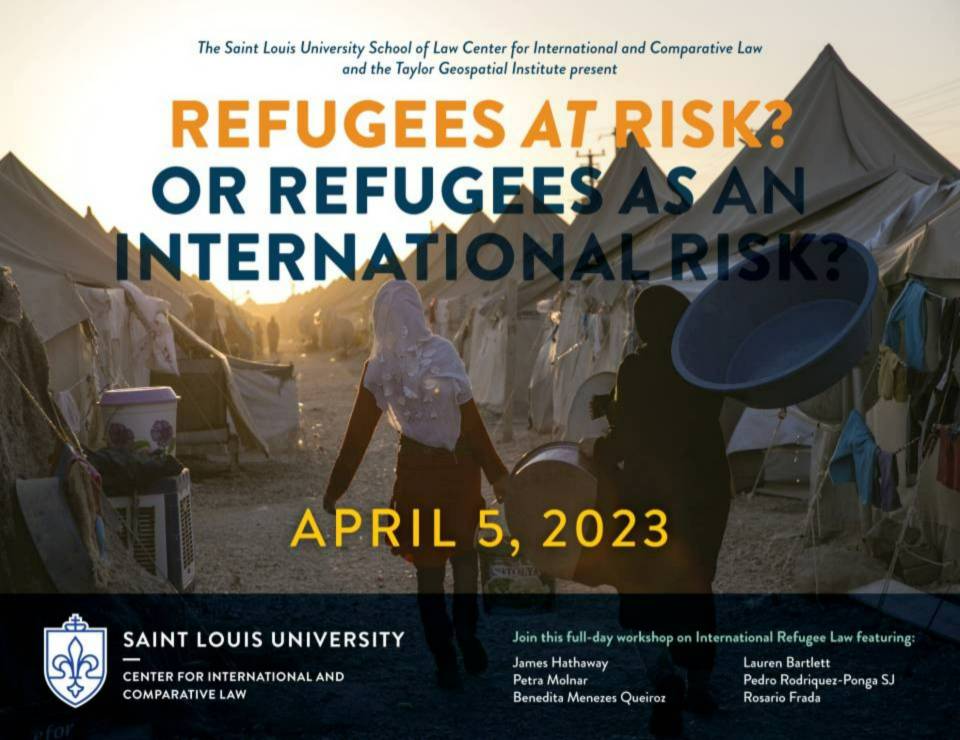Other Notable Events
The Center for International and Comparative Law at Saint Louis University hosts events throughout the year that showcase the expertise and scholarship of faculty and visiting researchers and scholars alike. The center also hosts a number of international events for our SLU LAW school community.
SLU LAW Alumni Trip in Madrid, Spain
May 29 - June 1, 2024

Please mark your calendars to join Dean William Johnson, the Center for International and Comparative Law, and fellow SLU LAW alumni in May 2024 to explore legal and cultural institutions in beautiful Madrid. For four days, SLU LAW alumni will attend timely presentations, interact with members of the Spanish bench and bar, explore the sights of Madrid, and network with other alumni. Registration for the Madrid Alumni Networking event is now live.
Past Events

Refugees at Risk to Refugees as an International Risk
Program
9.15 am: Welcome by Dean William Johnson
9.30am: Keynote Speaker: Professor James Hathaway
The Global Cop-Out on Refugees
This presentation will describe the crisis in global refugee protection; the inadequacy
of the UN’s steps to respond and outlines an alternative proposal for how to revitalize
the protection mechanisms under the UN’s Refugee Convention.
11 am: Professor Benedita M. Queiroz
Questioning Refugee Law; What to make of the Present Legal Framework.
This talk explores the structural fragilities of the international refugee protection
system and the challenges experienced by refugees and other displaced persons within
the EU Asylum System. The presentation will focus on two key themes of this protection
regime: exclusion and inequality. These issues could be addressed from the viewpoint
of a) the design of refugee protection and b) the exclusion of refugees and other
displaced persons from the regime.
11.30 Professor Lauren E. Bartlett
Towards the abolition of immigration detention in the U.S.: Start with Children.
For over a decade, human rights mechanisms have been calling for the prohibition of
the detention of children, with or without their parents, on the basis of their immigration
status. And yet, the United States (and many other nations across the globe) continue
to detain hundreds of thousands of children each year. Exploring a path toward the
abolition of immigration detention centres in the United States using human rights
tools, this talk will focus on detained migrant children and the argument that the
United States should start by prohibiting any deprivation of liberty of migrant children,
no matter how brief, based solely on migration status.
12 pm: Round Table between Professors Hathaway, Queiroz and Bartlett
2.pm: Professor Petra Molnar (University of York)
Technological Violence Through High-Risk Experiments at the Border.
Practices of border violence increasingly rely on high-risk technological experiments.
Predictive analytics used for interdictions, AI-power lie detectors and powerful sound
cannons are just some of the more recent tools that states, private entities, and
even international organizations use to manage migration. Certain places like borders
serve as testing grounds for new technologies, because regulation and oversight is
limited and an ‘anything goes’ frontier attitude informs the development and deployment
of surveillance and automation. A growing multi-billion dollar border industrial complex
also underpins the development and deployment of high-risk new technologies. Based
on comparative work in Europe, East Africa, and the US-Mexico border since 2018, this
talk attempts to foreground the lived experiences of people on the move as they are
interacting with the sharpest edges of experimental border technologies and blends
ethnographic methodology with international human
rights law analysis. The issues around emerging technologies in the management of
migration are not just about the inherent use of technology but rather about how it
is used and by whom, with states and private actors setting the stage for what is
possible and which priorities matter. Who gets to ask questions about proposed innovations
and why are perspectives from the ground up relegated to the margins?
3.15 pm: Pedro Rodriguez-Ponga
Hospitality questions States’ Sovereignty.
There is a growing concern regarding situations in which irregular migrants are rejected
at the borders without the respect that International Law contemplates them with.
These events show the inevitable dialectic between the rights of sovereign States
to control migration and the duty to protect migrants’ human rights. Pedro’s presentation
hopes to shed some light on the philosophical and legal dilemmas that emerge at the
borders concerning the rights of asylum-seekers and irregular migrants. The tradition
of the philosophical concept of ‘hospitality’ provides the guidelines for a fair balance
between two apparent diverse forces: State sovereignty vs Refugees’ rights.
3.45 pm: Rosario Tome
Literature and Refugees: From Invisibility to Recognition.
Refugees increasingly confront non-entrée regimes partly characterized by a post-9/11
logic that places a frame of (inter)national security in competition with a frame
of humanitarianism and defies the foundational premises underlying the refugee regime.
Applying a multidisciplinary approach, this section considers the manner in which
literature disrupts monolithic imaginaries of forced displacement to understand whether
the Refugee Convention safeguards against fragmented protection under state-centric
conditions. By asking who or what is invisible, as well as to whom, it will explore
how literature highlights protection gaps and defies IRL’s boundaries, as well as
the ways in which it provides a space for reimagining refugee protection. Importantly,
it will seek to provide a stage for refugee narratives to engage in dialogue with
the wider public and honor the way in which refugee and non-refugee thinkers represent
refugees’ confrontations with legal determinations.
4.15 pm: Round Table between Professor Molnar, Pedro Rodriguez-Ponga and
Rosario Tome
Bios
Petra Molnar is a lawyer and anthropologist specializing in technology, migration, and human rights. She is the Associate Director of the Refugee Law Lab at York University and runs the Migration and Technology Monitor, a multilingual archive of work interrogating technological experiments on people crossing borders. Petra is working on her first book, Artificial Borders: AI, Surveillance, and Border Tech Experiments (The New Press 2024), and is a 2022-2023 Fellow at the Berkman Klein Centre for Internet & Society at Harvard University.
Professor Lauren E. Bartlett joined St. Louis University School of Law in 2019. Her work focuses on the intersections between human rights, access to justice, and legal ethics. In Spring 2020, she launched a new Human Rights at Home Litigation Clinic at St. Louis University School of Law. Through the clinic, Professor Bartlett and her law students provide free civil legal services to and file international human rights complaints on behalf of immigrants and incarcerated people in the St. Louis region.